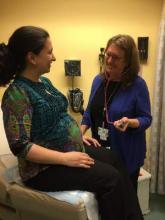About 25% of family physicians continue to do obstetric deliveries, while an estimated 75%-90% prescribe birth control.
Yet, while a self-assessment module (SAM) exists to test knowledge in maternity care, the same is not true for family planning. Thus, the creation of a family planning SAM is overdue, according to Dr. Linda Prine.
At press time, 958 family physicians agreed, as evidenced by their signatures on a letter urging the American Board of Family Medicine (ABFM) to develop a family planning SAM.
The letter was initiated by the Reproductive Health Care Member Interest Group of the American Academy of Family Physicians, which is chaired by Dr. Prine. The group has written a proposal for the SAM, assembled a team of volunteer physicians to work on the SAM, and launched the petition to demonstrate interest, which is a required first step in the process. As a result, the group is well on its way to reaching its goal of obtaining 1,000 signatures.
“Family planning is an integral part of family medicine care. Most women of reproductive age decide to have an average of two children during their childbearing years. During the rest of those years, many will need to use contraception,” Dr. Prine of Mount Sinai Hospital, New York, said in an interview.
Recent studies have found that there is a shortage of family physicians who are knowledgeable and trained in all aspects of family planning, especially long-acting contraceptives such as intrauterine devices and implants. A family planning SAM may motivate family doctors to become more up to date in newer contraceptive methods and at least recommend them, if not provide them to patients, she said.
Providing family planning services – as just one part of the overall cradle-to-grave care of patients and their children, partners, and parents – is what family medicine is all about, she added.
Indeed, according to the AAFP, family physicians play a critical role in family planning.
“On any given day, family physicians all over the country are inserting intrauterine devices and progesterone implants and performing vasectomies,” said Dr. Jennifer Frost, medical director of the Health of the Public and Science division at the AAFP.
The AAFP also has a policy promoting the use of long-acting reversible contraceptive (LARC) methods.
“Family physicians are well trained in this area and provide these services to patients every day. In fact, the insertion of LARCs is an integral part of our residency training,” Dr. Frost said, adding that the array of contraceptive methods available and the increasing amount of data on the safety and efficacy of various options requires that family physicians be knowledgeable about the options available for those who want to prevent pregnancy, and about providing preconception care to those who want to become pregnant.
A recent Centers for Disease Control and Prevention report stated that nearly all women use contraception at some point in their lifetimes. The report, published in December, cited data from the 2011-2013 National Survey of Family Growth showing that nearly 62% of the 60.9 million women aged 15-44 years in 2011-2013 were currently using contraception, and that most used oral contraceptive pills (16%), female sterilization (15.5%), male condoms (9.4%), and LARCs (7.2%).
These data underscore the importance of competency with respect to all aspects of family planning, Dr. Prine said.
The availability of a family planning SAM for those who desire to improve their knowledge of contraceptive technologies would not only provide family physicians with an important tool for keeping up to date on contraceptive methods and issues regarding family planning but would show that the specialty recognizes the importance of the topic and follows evidence-based practices, she said.
Dr. Prine continues to collect signatures. Once more than 1,000 supporters have signed, the petition will be delivered to the ABFM for consideration.
The petition, which is addressed to Dr. Michael D. Hagen, ABFM senior vice president, states in part that the undersigned “see women and couples to discuss family planning needs with great frequency,” and that family planning “is an area of care that is core to our practices, and one that has an increasingly large area of content as new products and devices are often emerging.”
The demonstration of interest and enthusiasm for creation of a SAM via the petition is just the first step in an involved and costly process, Dr. Hagen said in an interview.
Maintenance of certification for family physicians has four main components: professionalism, life-long learning, demonstration of cognitive expertise or knowledge via an examination taken every 7-10 years, and quality improvement.



